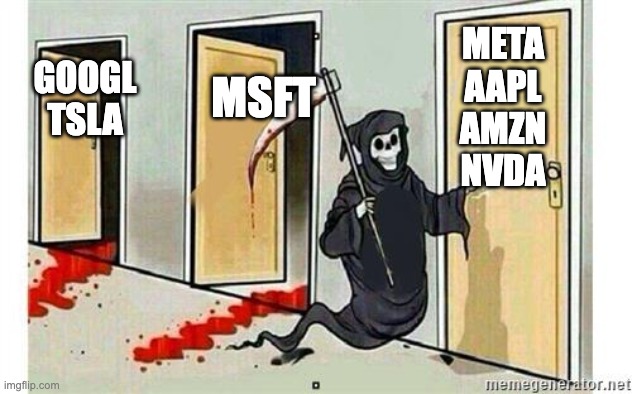Microsoft (MSFT) is the third Magnificent 7 stock to report its results for the March to June quarter and is also the third M7 stock to experience a sell-off following its earnings release. Microsoft stock dropped as much as 7% during after-market hours but recovered some ground to end with a 3% decline.

However, it could follow Alphabet’s footsteps, where the stock dropped about 2% during after-market hours but fell by 5% when the market opened the following day. Tesla fared worse, with a 12% drop after its results. This trend does not bode well for Microsoft.
Both Alphabet and Microsoft reported good results in my view, sustaining double-digit percentage revenue growth. Microsoft reported a 15% year-over-year growth, with Azure revenue jumping 29%, of which 8 percentage points were contributed by AI. Thus, AI investments have translated into tangible returns. Looking across Microsoft’s various segments, growth was seen in all of them. Even the revenue growth guidance of 13.8% for the following quarter met expectations. The business is healthy, so why the sell-off?

I believe it has nothing to do with the underlying business but rather that the share prices have advanced too much. At some point, more investors intend to sell than to buy, and we are at that point now. Despite Microsoft declining 7% in the past month, the stock remains overvalued. I hope the share price continues to fall to its fair value so that investors can buy it up again.
The sell-off on Nvidia (NVDA) was even worse, with Nvidia down 7%. The darling of the stock market is losing investors’ support, bringing down the rest of the semiconductor stocks.

However, AMD and Samsung reported solid results, giving investors hope that the AI bull run is far from over. AMD reported its AI chip sales grew by 115% year-over-year, propelling the stock up 8% during after-market hours. Samsung, whose memory chips are in high demand for AI computing, saw its revenue increase by 23% and operating profits surge by 1458% year-over-year. The average selling prices for these memory chips have been rising.
I believe that the recent AI stock sell-off is more of a pullback than the start of a crash. Demand remains hot, and business revenues and earnings continue to rise. However, the share prices of these stocks need to be moderated further to cool off the speculative forces for a while.
Meanwhile, sector rotation continues. Some downtrodden blue chips have shown signs of life.
The first is 3M (MMM). If you held 3M stock for 10 years between 2013 and 2023, you would have lost money even after factoring in dividends. That was how poorly this household name stock was performing. However, after the latest quarter results showed it regained profitability from a year ago, the stock rallied 20% in one day! The stock has also bottomed from a technical analysis perspective, achieving a 2-year high, trending up, and prices above the moving averages. While I wouldn’t buy it as a long-term holding due to a lack of growth, trading the trend for a short period may be worthwhile.

The next beaten-down stock is PayPal (PYPL), which jumped more than 8% following its 2Q24 results. Revenue and earnings both beat estimates, and investors loved the surprise.

However, unlike 3M, PayPal hasn’t appeared to get out of its rut as the share price is still ranging despite the 8% gain and being undervalued. It might be too early to bet on a recovery.

Some small caps saw price jumps following their earnings results, indicating that market rotation is becoming more real as time goes by:
- Commvault Systems (CVLT) +23%
- Varonis (VRNS) +15%
- Sprouts Farmers (SFM) +13%
- F5 (FFIV) +13%
For now, wait for the big caps to fall to their fair values. In the meantime, small caps are where the action is.

